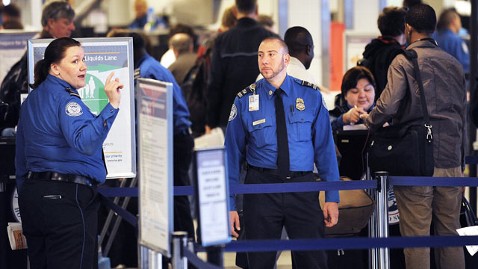TSA to Allow Pocket Knives On Planes
As the nation braces for potentially extended airport security lines because of the federal budget sequester, the Travel Security Administration (TSA) has announced they will allow small pocket knives and certain sporting goods on planes for the first time in more than a decade.
TSA Administrator John Pistole announced the change today at an aviation security conference in New York.

Stan Honda/AFP/Getty Images
Starting April 25, passengers flying on U.S. flights will be allowed to carry small pocket knives - blades less than 6-centimeters, up to two golf clubs, ski poles, as well as sporting sticks used for hockey, lacrosse, and billiards. Baseball bats will remain on the no-fly list, though wiffle-ball bats and souvenir baseball bats (less than 24-inches long) will be allowed.
"These are popular items we see regularly," agency spokesman David Castelveter told Bloomberg News. "They don't present a risk to transportation security."
The move comes following a recommendation by a TSA working group that such items are not a security threat. The move will conform to international rules that currently allow the small knives and sporting goods.
"Frankly, I don't want TSA agents to be delayed by these," Pistole told the audience. Adding that TSA screeners at Los Angeles International Airport in the last three months of 2012, seized 47 of the small knives per day.
The Flight Attendants Union Coalition, which represents the 90,000 flight attendants on carriers nationwide, blasted the announcement calling it "poor and shortsighted."
"Continued prohibition of these items is an integral layer in making our aviation system secure and must remain in place," the statement said. "As the last line of defense in the cabin and key aviation partners, we believe that these proposed changes will further endanger the lives of all Flight Attendants and the passengers we work so hard to keep safe and secure."
Razor blades and box-cutters, like those used by the 9/11 terrorists, will still be banned.
"There is just too much emotion involved with those," Pistole said at the conference.
The Transportation Security Administration announced last week they would be reducing "frontline workforce," those who screen passengers prior to accessing a flight gate, and thereby lead to increased passenger wait times at airport security checkpoints.
The cuts come from a freeze of airport security screeners hiring and cutbacks on overtime, due to sequestration.